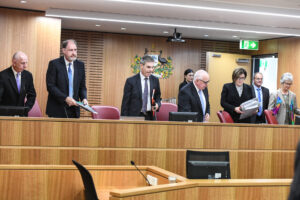Wages are growing the best they have for 11 years, but real wages are now back at the level they were 14 years ago
The good news of the strongest wages growth since 2012, writes policy director Greg Jericho, in his Guardian Australia column, is tempered by the fact that real wages have fallen back to levels last seen in early 2009.
The 3.7% growth in the wage price index demonstrates that workers are finally seeing some return for the tighter labour market in which unemployment is at around 50-year lows. It also reflects that public servants are also becoming free of the wage caps over the past decade that had purposefully kept wages down.
In the March quarter for the first time in more than a decade, public-sector wages grew by 0.9%. Private-sector wages have also grown above 0.75% for 4 straight quarters – the first time since September 2012.
But even with this very good wage growth, workers are seeing their living standards fall. In real terms, wages fell 3.1% in the past year and are now 5.4% below where they were before the pandemic. This destruction of purchasing power will take many years to recover. And it highlights that wages should rise faster than inflation and with workers being the ones who have suffered the most from inflation, they should not be expected to suffer once inflation is back within normal ranges.
You might also like
Feeling hopeless? You’re not alone. The untold story behind Australia’s plummeting standard of living
A new report on Australia’s standard of living has found that low real wages, underfunded public services and skyrocketing prices have left many families experiencing hardship and hopelessness.
The continuing irrelevance of minimum wages to future inflation
Minimum and award wages should grow by 5 to 9 per cent this year
Go Home On Time Day 2025. As full timers disconnect, part timers are doing more unpaid overtime
New research by the Centre for Future Work at The Australia Institute has revealed a disturbing new twist when it comes to unpaid overtime in Australia.

